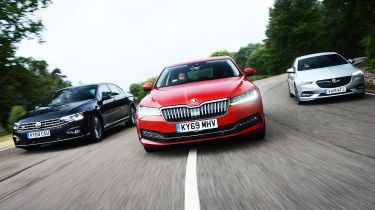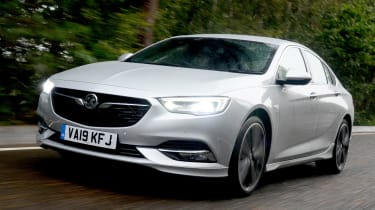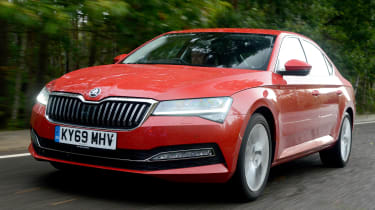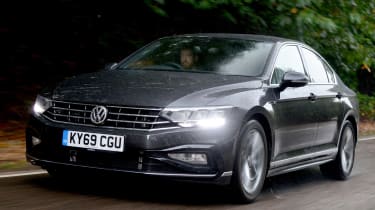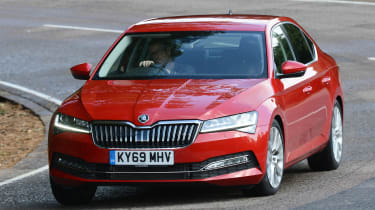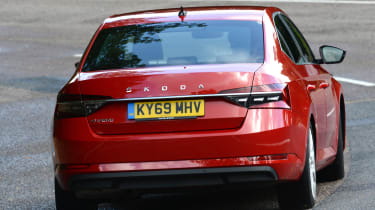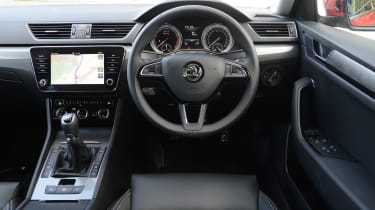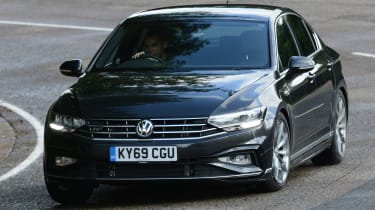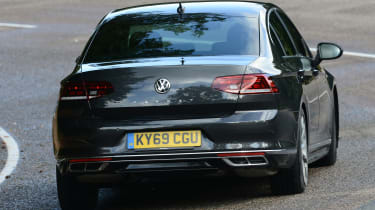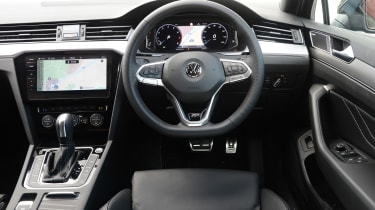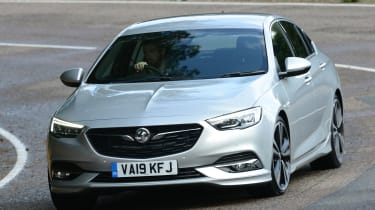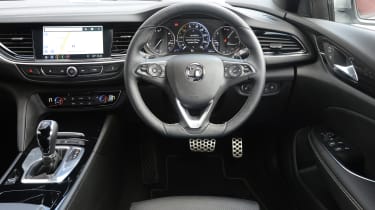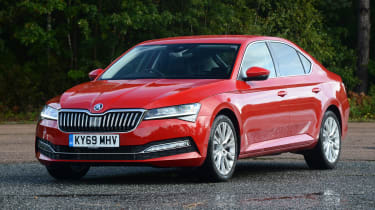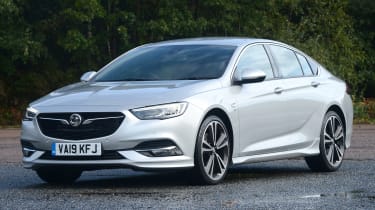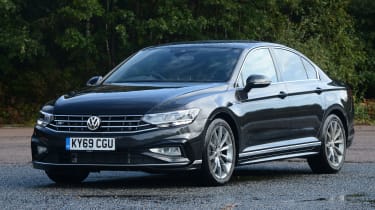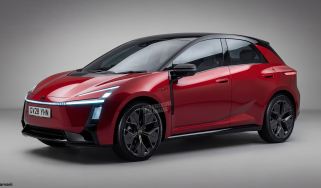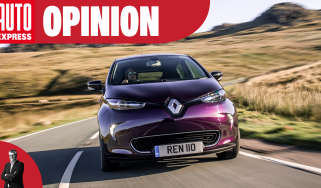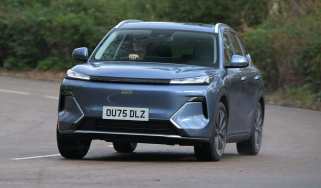Skoda Superb vs Volkswagen Passat vs Vauxhall Insignia: which is the ultimate used family car?
Saloons and fastbacks still have plenty to offer buyers of family cars, so we put three of the best used models to the test
Today, many drivers who are in the market for a second-hand family cars are likely to be wooed by an SUV. But if you’re one of these buyers who don’t really need a big upright boot, or a high seating position, there’s still an awful lot to be said for a large family saloon or fastback.
Despite not being able to fit a big dog in the boot, for example, you can still get a vast capacity for luggage and the weekly supermarket shop. Furthermore, these models offer spacious rear seats and look a bit more businesslike than your typical family runabout. In this test we are running the rule over three of the most competitive used vehicles in this class.
The Vauxhall Insignia Grand Sport looks incredibly sharp and is excellent value for money, but doesn’t feel at all cheap and cheerful, making it a formidable player in this market. To win the test, it must beat another highly competent rival: the Skoda Superb, a brilliant family car that shares DNA with the Volkswagen Passat, which is our third contender.
As always, we’re here to find out which of the trio makes the best second-hand buy.
Vauxhall Insignia
- For: Well equipped for the price, comfortable ride even on large alloys, spacious rear seats, good build quality.
- Against: Boot is smallest here when rear seats aren’t folded down, some cheaper materials to be found in cabin.
Used - available now

2024 Skoda
Superb
46,475 milesAutomaticPetrol2.0L
Cash £20,549
2024 Skoda
Superb
54,500 milesAutomaticDiesel2.0L
Cash £15,099
2023 Skoda
Superb
46,906 milesAutomaticPetrol1.4L
Cash £15,849
2024 Skoda
Superb
18,774 milesAutomaticDiesel2.0L
Cash £22,990The Vauxhall Insignia Grand Sport was our Used Family Car of the Year in 2021 and it’s not hard to see why.
Although its cabin does contain a few cheaper materials, the overall build quality is hard to fault and there’s a huge amount of standard kit as well. The SRi VX-Line Nav model we tested comes with 20-inch alloy wheels, dual-zone climate control, a seven-inch infotainment touchscreen, a heated steering wheel, autonomous emergency braking, lane-keep assist and two USB sockets for the rear passengers.
Despite those large alloys, the Insignia rides well. It’s an aspect of its refinement that will be even more noticeable in examples fitted with smaller wheels. Potholes and bumps aren’t much of a disturbance and, in addition to riding smoothly, the Insignia feels pleasingly planted and firm most of the time.
Practicality is another strong point. There’s enough space for taller adults to fit in the back without the front seats being moved too far forward and, while the 490-litre boot is the smallest here, the hatchback design allows it to increase to 1,450 litres if the rear seats are folded, more than the VW can manage.
BUY A USED VAUXHALL INSIGNIA NOW
Skoda Superb
- For: Exceptional amount of boot space and rear-seat legroom, fantastic interior build quality, great to drive.
- Against: Highest used starting price here, less impressive equipment list than the Vauxhall Insignia’s.
The Superb was narrowly pipped by the Insignia Grand Sport to the title of Best Used Family Car in 2021, but taking top honours in our used estate-car category underlines just how good the Skoda is. Not only do we think highly of this second-hand model then, but owners do as well; the Superb (including both the hatchback and estate) was voted into second place overall in our 2021 Driver Power used-car survey.
The SE L model we tested comes with 18-inch alloy wheels, matrix LED headlights, heated seats, blind-spot detection, keyless entry, adaptive cruise control and dual-zone climate control as standard.
Its ride quality is as impressive as the Insignia’s, even over rough road surfaces. The Skoda feels assured on motorways and B-roads alike, while its steering is a little more precise than the Vauxhall’s.
The Superb’s interior build quality is absolutely top-notch, as is the 9.2-inch infotainment touchscreen. Where the Skoda really shines, though, is practicality. There’s a vast amount of rear leg and headroom, while the boot is by far and away the largest here, both with the rear seats in place and folded down.
Volkswagen Passat
- For: Cheapest used starting price, well made inside and out, comfortable ride and composed driving dynamics.
- Against: Saloon shape means maximum practicality is hindered next to rivals, while equipment list doesn’t impress
The Volkswagen Passat also featured in our Best Used Family Cars 2021 list, but only managed to work its way into fourth place. It was a respectable result, but not on the same level as its rivals in this test.
Sharing a lot with the Superb, the Passat is similarly equipped. Our SE L test car features standard-fit 17-inch alloys, heated leather seats, an eight-inch touchscreen infotainment system with nav, adaptive cruise control and wireless phone charging.
The virtues of these two cars are similar as well. Like the Superb, the Passat is refined and rides nicely, while also offering decent handling.
Build quality is strong, too, as one might expect from a Volkswagen, although no better than that of the Superb. In fact, the cabin of the facelifted Passat shows a few signs of cost-cutting compared with its predecessor, which is disappointing.
What’s more, the Passat is a true saloon rather than a fastback like the Insignia and Superb. This means that while you get an impressive 586-litre load bay as standard, the total boot capacity only extends to 1,152 litres when the seats are folded.
BUY A USED VOLKSWAGEN PASSAT NOW
Check the prices of a Vauxhall Insignia, Skopda Superb or Volkswagen Passat with our free car valuation tool...
Which one should you choose?
First place: Vauxhall Insignia
There's nothing the Insignia Grand Sport really gets wrong. If you can live with a 490-litre boot and a few scratchy plastics in the cabin, you’ll not find a better used family car.
Second place: Skoda Superb
This is such a close-run battle, but the Insignia simply represents a better-value proposition than the Superb. If you need lots of space, though, the Skoda is better.
Third place: Volkswagen Passat
The Volkswagen Passat is still a perfectly competent family saloon, but its list of virtues simply doesn’t match up well enough to the rivals it faces here.
Did you know you can sell your car with Auto Express? Get the highest bid from our network of over 5,500 dealers and we'll do the rest. Click here to try Auto Express Sell My Car now...
Skoda Superb vs Volkswagen Passat vs Vauxhall Insignia new car test: December 2019
Below is our original group test of the Skoda Superb, Volkswagen Passat and Vauxhall Insignia as published in 2019. All information correct at time of publication...
There was once a time when anyone wanting a large family car would go searching for a spacious saloon – but thanks to the huge choice in the market in 2019 those days are over. That doesn’t mean the large family car class is gone, though, and in fact two of the best models in this market sector have recently been updated by their respective makers: the Skoda Superb and the Volkswagen Passat.
Big family saloons and hatchbacks like these may not be as popular as SUVs at the moment, but they offer a huge amount of car for the money. They have incredibly practical boots, room for the tallest adults to sit in the rear and loads of standard kit, despite their affordable price tags.
While the two new cars have each other to take on, there’s another model that has dominated this class since it arrived: the Vauxhall Insignia Grand Sport. It has kept hold of the top spot so far because it has all the best aspects of the cars in this class, but is even better value. Here we’ll find out if the updates to the Superb and Passat can take either of them to a class win.
Skoda Superb
| Price | £27,725 |
| Engine | 1.5-litre 4cyl petrol, 148bhp |
| 0-60mph | 9.1 seconds |
| Test economy | 33.2mpg/7.3mpl |
| CO2 | 120g/km |
| Annual road tax | £145 |
The Skoda Superb has always been highly competitive in this class, because it’s one of the most spacious cars around. Here we’re testing an SE L model with the 1.5-litre petrol engine and a manual transmission, which costs £27,725.
Design & engineering
There are a few external changes for this updated Superb; new headlights, a new grille and redesigned bumpers are the most significant alterations. It’s still based on the widely used VW Group MQB platform, which means it shares parts and engines with many other models. The new Superb will be available in 2020 with plug-in hybrid technology, but here we’re looking at a 1.5-litre petrol with a six-speed manual gearbox (a DSG auto version is also available). This powertrain is also found in the VW Passat, which uses the same architecture in its construction.
There are MacPherson struts up front and a multi-link rear structure, which gives the car a good basis for comfort and tidy handling. Plus, Dynamic Chassis Control (DCC) is available for £955 on the SE L model. This adds adaptive dampers that can be put in Comfort, Normal or Sport settings.
One of the Superb’s most notable features is its 2,841mm wheelbase, which is long and allows for a huge amount of interior space (see Practicality). It’s the longest wheelbase of the three cars here, yet the Skoda’s shorter overhangs make it the shortest when it comes to overall length.
Interior quality is high, and SE L models get leather seats as standard. The dashboard design is neat and tidy, which means it’s easy to use as well as having a modern look, and that’s helped by the excellent infotainment options. An eight-inch set-up is standard on this model, but for £965 you can get the Technology pack, which adds a huge 9.2-inch display screen for an even more modern look.
Standard equipment on SE L models includes 18-inch alloy wheels, matrix LED headlights, heated seats, blind-spot detection, keyless entry, adaptive cruise control and dual-zone climate control.
Driving
Its excellent ride, even over poorly surfaced roads, gives the Superb a huge amount of appeal. The suspension is able to control body movements well, while still providing enough damping to keep bumps from jolting into the cabin. Mid-corner imperfections are seen off as well, so you can actually drive the Skoda quickly on country roads because it feels so composed and secure.
This assured feeling does take away from the driving experience a bit, though. It’s hard to get a sense of what the car is doing underneath you, especially because the light steering gives little feel or feedback. Still, the manual gearshift is mechanical, if a little light, which means it’s satisfying to use and adds a lot to the driving experience. It’s very similar to the Passat’s, and both are more precise than the Vauxhall’s.
The Skoda’s 1.5-litre engine is another strong point; it’s really quiet and smooth, and with 148bhp and 250Nm of torque, it delivers decent performance. But it fell behind its rivals here in our acceleration tests. The Superb took 9.1 seconds to go from 0-60mph, but the Passat clocked 8.6 seconds and the more powerful Insignia 7.8 seconds. Similarly, the Skoda needed 8.8 seconds to go from 30-70mph through the gears, but the Passat took 8.1 seconds and the Insignia managed it in seven seconds flat.
Ultimate performance isn’t an issue in this sort of car, though, because they’re better suited to more relaxed driving. Many buyers will plan long trips in the big Skoda, and it excels here, with the comfortable ride, plush seats and quiet cabin making it a very good motorway cruiser. The motor is also at its best when you change up early and rely on the torque, because it’s nearly inaudible at low revs. While this is true in the Passat as well, the Superb has enough performance for it to be fun, too.
Practicality
Thanks to its long wheelbase, the Skoda has the kind of legroom usually reserved for luxury models a size above. Even the tallest adults will be able to relax easily in the rear seats, because the gap to the back of the front ones is huge. There’s lots of light, too, thanks to the large windows, and headroom is plentiful.
Then there’s the Superb’s boot, which is just as impressive. At 625 litres, it’s by far the biggest here, and the big hatchback tailgate makes loading and unloading much easier than in the Passat. The VW has 586 litres and the Insignia has 490 litres. There’s more than enough room for a family’s suitcases.
Ownership
Skoda is a consistent high-scorer in our Driver Power satisfaction surveys, and in the 2019 poll the brand came fifth out of 30. Volkswagen came a poor 17th, while Vauxhall came in a very disappointing 29th place. Superb safety kit includes AEB, blind-spot assist, parking sensors and a driver tiredness sensor. Lane assist costs £515, and traffic sign recognition is a very reasonable £90 (or it comes with the Technology pack).
Running costs
The relatively small petrol engines in our test trio keep Benefit-in-Kind (BiK) tax low, and their affordable list prices mean they make great company cars. The Skoda’s 28 per cent BiK rate means it will cost a standard-rate earner £1,540 a year in tax, a little more than the Passat’s £1,509 annual bill (it’s in the same BiK bracket). The Insignia emits more CO2, putting it in the 33 per cent class, and costs £1,723 a year in tax.
Testers’ notes
“Our Superb was fitted with optional 18-inch Antares alloy wheels (£470) and Velvet Red paint (£975), but the rest of the impressive kit list comes as standard, which boosts its appeal.”
Volkswagen Passat
| Price | £27,380 |
| Engine | 1.5-litre 4cyl petrol, 148bhp |
| 0-60mph | 8.6 seconds |
| Test economy | 36.9mpg/8.1mpl |
| CO2 | 122g/km |
| Annual road tax | £145 |
This refreshed Volkswagen Passat has new tech and some small cosmetic changes, just like the Superb. In SEL form with the 1.5-litre petrol engine, matching its Skoda rival very closely, it costs £27,380.
Design & engineering
Unlike the other cars in this test, the Passat really is a saloon, with a separate cabin and boot. The Superb and Insignia have hatchback tailgates, despite their saloon-like body shapes. This is a key distinction, because there are relatively few actual saloon cars in this class now, so if you prefer having a separate boot and cabin, the Passat is the only option, at least in this test.
Like the Superb, the VW’s front has had a small redesign, and the engine range has been updated, too. The GTE plug-in hybrid variant returns with this facelift, but here we’ve got the same 148bhp 1.5-litre petrol engine as in the Skoda. It features cylinder-deactivation tech, which reduces fuel consumption under light load. It’s easy to tell when this is working, because a little ‘eco’ icon appears on the dash.
As with both rivals, the Passat has a six-speed manual gearbox (although our pictures show an auto, we extensively tested a manual), and is front-wheel drive in this configuration.
Interior quality is about on par with the Superb’s. VW has removed the analogue clock that used to sit on the top of the dash, and now there’s just a Passat logo on the facelifted car, which is disappointing, as it’s an obvious area of cost-cutting. Still, the materials used are of good quality and it’s put together very well, just like its Skoda stablemate. Standard kit on SEL includes 17-inch alloy wheels, heated leather seats, an eight-inch touchscreen infotainment system with sat-nav and online services, adaptive cruise control and wireless phone charging.
Driving
The 1.5-litre petrol engine in the Passat is very quiet; at idle it’s barely audible in the cabin, and when you’re on the move it’s soon drowned out by wind and road noise, although neither of those are intrusive. It means the cabin is very relaxed and quiet, so the Volkswagen makes a great motorway cruiser.
The cylinder-deactivation tech kicks in when you’re travelling at a constant speed, too, so economy is good on long trips, yet when you put your foot down there’s no noticeable shift as the other cylinders come back on; it’s seamless, as with the Skoda. In-gear performance is stronger than in the Superb, despite the engines being the same. The Passat went from 30-50mph in fourth gear in 6.1 seconds, but the Skoda clocked 6.6 seconds. The Insignia was faster still, taking just five seconds.
In top gear the Volkswagen went from 50-70mph in 9.4 seconds, which was 1.1 seconds quicker than the Skoda and two seconds behind the Vauxhall.
A slick gearshift and precise steering mean the Passat can be fun to drive, too. The steering doesn’t give much feedback as to what the front wheels are doing, but that’s true of all three cars, and there’s enough grip that you don’t need this information to drive quickly. What makes the VW impressive on back roads is its relatively composed ride, which deals with big undulations as well as harsher bumps well, and the 17-inch alloys on SEL models are key to this. We tried a model on larger rims and it had a stiffer ride that couldn’t mask the worst lumps and bumps– yet our test car was smooth and very composed.
This isn’t just beneficial to ride comfort, because it means the Passat can maintain speed where bumps mid-corner would unsettle versions on larger wheels. Yet in this group test, it’s tough to separate the three cars in this area, because they’re all very impressive, and there’s no clear winner or loser when it comes to the driving experience and suspension.
Practicality
The VW’s saloon body has some small benefits, but it’s not as practical as either rival. The separate boot door means you can access luggage on wintry days without letting cold air rush into the cabin, but it does restrict total luggage space and loading practicality.
There’s a large 586-litre load bay with the seats up, but fold them down and it only expands to 1,152 litres. That’s way behind the Skoda and Vauxhall, which have 1,760 and 1,450 litres respectively. This is because the fixed rear window area doesn’t rise up with the boot lid, so it’s tighter inside. It’s the least practical model here, but that is a relative term. Still, rear-seat leg and headroom are excellent, with more than enough space for adults, even if it’s slightly less roomy than the Superb overall.
Ownership
All three models scored five stars in their respective Euro NCAP crash tests. The Passat was evaluated in pre-facelift form in 2014, and scored well in the Safety Assist and Child Safety categories. The extra safety kit you get now can only improve on that; there’s AEB, lane-keep assist and adaptive cruise control as standard on SEL. It’s a shame blind-spot assist isn’t available, though. Volkswagen slipped to 17th place in the makers’ chart in our Driver Power 2019 survey, behind Skoda’s fifth but ahead of Vauxhall’s 29th place.
Running costs
You might expect poor fuel economy from a petrol engine in a large family car, but all three returned well over 30mpg on test. The Passat returned 36.9mpg, which equates to £1,891 a year at current fuel prices, while the Skoda – with the same powertrain – recorded 33.2mpg (£2,102 per annum). The Vauxhall returned 39.6mpg (£1,762 per year). Fixed-price servicing on the VW costs £297 for two years – cheaper than both rivals.
Testers’ notes: “Our pictures show a Passat in sportier R-Line trim, which comes on larger wheels. We’d recommend saving some cash and improving comfort levels by going for the SEL model we tested”
Vauxhall Insignia
| Price | £26,365 |
| Engine | 1.6-litre 4cyl petrol, 197bhp |
| 0-60mph | 7.8 seconds |
| Test economy | 39.6mpg/8.7mpl |
| CO2 | 145g/km |
| Annual road tax | £145 |
Vauxhall's Insignia Grand Sport is an Auto Express New Car Awards winner, having taken the crown this year in the Large Family Car category. This 197bhp 1.6-litre petrol model was taken off sale just before we went to print, but there will be plenty of models available new from dealer stock. It costs £23,365, while there is a 1.5-litre model with 163bhp available that costs £24,825 in SRi VX-Line Nav trim.
Design & engineering
The Vauxhall’s engine is only a little larger in capacity than the 1.5-litre engine in its rivals, but it produces 197bhp and 300Nm of torque, so performance is excellent. It’s fitted with a six-speed manual gearbox.
Like the VW and Skoda, the Vauxhall uses MacPherson struts at the front and a multi-link set-up at the rear. Adaptive dampers – Vauxhall calls its system FlexRide – are available, allowing a choice between Normal, Sport and Tour stiffness settings. There isn’t too much benefit with these, so we’d stick with the standard set-up, which is well judged.
The Insignia Grand Sport is a hatchback rather than a saloon, and there is also an estate version – just as with both rivals. However, there’s no plug-in hybrid variant of the Vauxhall available at all; there are only petrol and diesel models, with the latter being the better choice for high-mileage drivers.
The Insignia’s interior isn’t its strongest point. While a good number of the materials are decent enough in quality, there are more cheap-looking and feeling plastics around the cabin, so it falls behind its rivals here a little. Build quality is on par with the others’, though; there aren’t any squeaks or rattles, although this could also be down to the plush suspension, which deals with lumpy roads well.
The car makes up for its plain-looking interior with the amount of standard kit you get. SRi VX-Line Nav features 20-inch alloy wheels, dual-zone climate control, a seven-inch infotainment system with nav, Apple CarPlay and Android Auto, a heated steering wheel, AEB, lane-keep assist and two USB sockets in the rear. This is on top of the fact that it offers a more powerful engine than either rival here regardless of whether you go for the older 1.6 or newer 1.5 (both will be available in dealers). In either form it’s cheaper than its rivals as well.
Driving
Vauxhall's 1.6-litre turbo petrol engine is quiet, especially at idle, something it shares with the 1.5; when you’re sat still, it’s barely audible in the cabin. With 300Nm of torque from just 1,700rpm, you don’t need to change gear as much to make progress, especially as the gear ratios in the Skoda and VW are rather long, so you often have to change down to get into the torque band. The gearshift here isn’t as light and precise as in its rivals, but it’s satisfying enough.
The engine pulls strongly, as you’d expect given its higher power output than the others. It went from 0-60mph in 7.8 seconds and from 30-70mph in just 7.0 seconds, the latter being more than a second quicker than the next-fastest car, the VW. In fact, the Insignia beat both rivals in all of our acceleration tests, highlighting its performance. Along with the punchy engine, the Vauxhall handles well and is as composed as its rivals on a twisty road. The steering doesn’t have much feel, but it’s naturally weighted and the Insignia feels agile, with good grip in bends. The suspension deals with bumpy roads very well, so even at speed it rarely feels unsettled.
Potholes and big bumps don’t cause shudders in the cabin, so the Vauxhall remains comfortable at low speed as well. Even versions of the car with larger wheels still ride relatively smoothly, which isn’t always the case in the Passat. But the Insignia has a couple of ergonomic issues that take away from comfort slightly. The gearlever is set too far back and the steering column restricts legroom for taller drivers. The seats are comfy, though.
Practicality
The Insignia Grand Sport has so much rear legroom that even with the front seats set right back, there’s enough space for tall adults to sit comfortably. It’s not quite as big in the back as the Superb, but there’s so much room in both that this is largely irrelevant.
There’s a little less light inside than in the Skoda, but headroom is good and the hatchback boot means that it’s versatile, too. While its load bay is smaller than the Passat’s, at 490 litres, the hatch means it opens out to 1,450 litres when the rear seats are folded. Plus it’s more practical if you’ll be carrying bigger items. Even with the smallest boot here, it’s still huge, and if you need even more space, all three cars are available as an estate, with extra roof height at the back adding even more practicality.
Ownership
Vauxhall’s 29th-place finish in our Driver Power 2019 poll was poor, as was its 24th place result for its dealer network. Lane-keep assist, AEB and parking sensors are all standard on the SRi VX-Line Nav model, though, so its safety performance should be better, but a reversing camera costs £350 and blind-spot assist is £650 as part of the Driving Assistance Pack Four.
Running costs
Large family cars tend not to hold their value too well, and these new models follow that trend. Our experts predict that the Insignia will retain 39.3 per cent of its purchase price after three years or 36,000 miles, shedding £16,014, slightly more than the Superb’s £16,000 loss. The Skoda is rated at 42.3 per cent. The Passat suffers the most in depreciation, at £16,581, thanks to a residual value of 39.4 per cent.
Testers’ notes: “The Insignia is a triumph for value, because the range starts at just £20,045. Even low-spec models are good to drive and when you factor in how much space you get, it’s a lot of car for the cash.”
Verdict
1st: Skoda Superb
Updates to the Superb have boosted its appeal in a few key areas, yet its core strengths – its huge boot, plentiful passenger room and quiet cabin – remain. The Skoda sneaks in ahead of the Vauxhall thanks to its top-notch infotainment set-up and greater practicality, while it’s also better equipped in SE L trim than its rivals. Even with a higher price tag, the more refined, more comfortable Superb offers plenty of value for money.
2nd: Vauxhall Insignia
The Insignia is starting to feel left behind by its rivals when it comes to tech and kit, but this is still a photo-finish simply because the Vauxhall is such good value. It’s the cheapest car here yet also the most powerful and best to drive, and still has plenty of equipment (unchanged in 1.5 form, too). It’s hugely practical and should be cheap to run, which is key. If your budget is lower, this is the car to have.
3rd: Volkswagen Passat
Volkswagen’s Passat shares a lot with the Superb, including its quiet and punchy engine, slick six-speed box and refined driving experience, but there are a handful of small issues that drop it down the pecking order. The saloon body means it’s not as practical as its hatchback competition, and it’s neither as well equipped as the Skoda nor as good to drive as the Vauxhall. So it just drops behind them in this close result.
Figures
| Skoda Superb 1.5 TSI 150 SE L | Vauxhall Insignia Grand Sport 1.6 SRi VX-Line Nav | Volkswagen Passat 1.5 TSI SEL | |
| On the road price/total as tested | £27,725/£29,290 | £26,365/£26,365 | £27,380/£27,380 |
| Residual value (after 3yrs/36,000) | £11,725/42.3% | £10,351/39.3% | £10,799/39.4% |
| Depreciation | £16,000 | £16,014 | £16,581 |
| Annual tax liability std/higher rate | £1,540/£3,080 | £1,723/£3,445 | £1,509/£3,018 |
| Annual fuel cost (12k/20k miles) | £2,102/£3,503 | £1,762/£2,937 | £1,891/£3,151 |
| Insurance group/quote/road tax cost | 21/£471/£145 | 25/£477/£145 | 20/£477/£145 |
| Servicing costs | £342 (2 years) | £19 per month (3yrs) | £297 (2 years) |
| Length/wheelbase | 4,869/2,841mm | 4,897/2,829mm | 4,873/2,786mm |
| Height/width | 1,469/1,864mm | 1,455/1,863mm | 1,483/1,832mm |
| Engine | 4cyl in-line/1,498cc | 4cyl in-line/1,598cc | 4cyl in-line/1,498cc |
| Peak power/revs | 148/5,000 bhp/rpm | 197/4,700 bhp/rpm | 148/5,000 bhp/rpm |
| Peak torque/revs | 250/1,500 Nm/rpm | 300/1,700 Nm/rpm | 250/1,500 Nm/rpm |
| Transmission | 6-speed manual/fwd | 6-speed manual/fwd | 6-speed manual/fwd |
| Fuel tank capacity/spare wheel | 66 litres/£150 | 62 litres/£110 | 66 litres/space saver |
| Boot capacity (seats up/down) | 625/1,760 litres | 490/1,450 litres | 586/1,152 litres |
| Kerbweight/payload/towing weight | 1,380/648/1,900kg | N/A/N/A/1,410kg | 1,425/555/1,600kg |
| Turning circle | 11.1 metres | 11.2 metres | 11.7 metres |
| Basic warranty (miles)/recovery | 3yrs (60,000)/3yrs | 3yrs (60,000)/1yr | 3yrs (60,000)/1yr |
| Driver Power manufacturer/dealer pos. | 5th/10th | 29th/24th | 17th/22nd |
| NCAP: Adult/child/ped./assist/stars | 86/86/71/76/5 (2015) | 93/85/78/69/5 (2017) | 85/87/66/76/5 (2014) |
| 0-60/30-70mph | 9.1/8.8 secs | 7.8/7.0 secs | 8.6/8.1 secs |
| 30-50mph in 3rd/4th | 4.8/6.6 secs | 3.5/5.0 secs | 4.5/6.1 secs |
| 50-70mph in 5th/6th | 8.4/10.5 secs | 5.9/7.4 secs | 7.8/9.4 secs |
| Top speed/rpm at 70mph | 136mph/2,100rpm | 146mph/2,500rpm | 137mph/2,200rpm |
| Braking 70-0/60-0/30-0mph | 50.5/37.1/12.1m | 47.8/34.6/8.7m | 55.1/35.3/12.6m |
| Noise outside/idle/30/70mph | 69/44/63/72dB | 69/42/69/74dB | 68/42/61/70dB |
| Auto Express econ. (mpg/mpl)/range | 33.2/7.3/482 miles | 39.6/8.7/540 miles | 36.9/8.1/536 miles |
| WLTP combined mpg | 38.7-42.8mpg | 39.2-42.2mpg | 44.1-45.6mpg |
| WLTP combined mpl | 8.5-9.4mpl | 8.6-9.3mpl | 9.7-10.0mpl |
| Actual/claimed CO2/tax bracket | 197/120g/km/28% | 165/145g/km/33% | 177/122g/km/28% |
| Airbags/Isofix/parking sensors/cam | Seven/yes/yes/£375 | Six/yes/yes/£350 | Seven/yes/yes/£335 |
| Auto box/lane-keep/blind spot/AEB | £1,400/£515/yes/y | £3,370/yes/£650*/y | £1,600/yes/no/yes |
| Clim./cruise ctrl/leather/heated seats | Yes/yes/yes/yes | Yes/y/£1,155/£410^ | £650/yes/yes/yes |
| Met paint/LEDs/keyless/pwr tailgate | £595/yes/yes/yes | £605/no/£300/no | £620/y/£420/£600 |
| Nav/digi dash/DAB/connected apps | Yes/£465/yes/yes | Yes/£1,160§/yes/yes | Yes/£2,200*/yes/yes |
| Wireless charge/CarPlay/Android Auto | No/yes/yes | £160/yes/yes | Yes/yes/yes |
